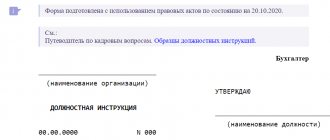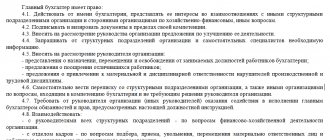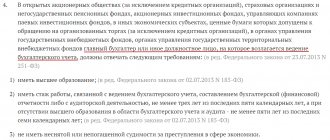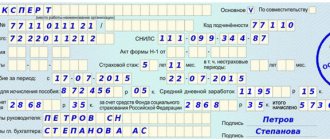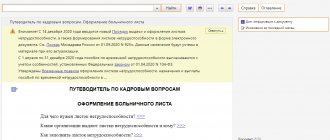Why does overpayment occur?
The following are possible reasons for overpayment to a dismissed employee:
- Technical errors identified during a payroll audit:
- untimely reflection of information on time worked and various deviations from the regular schedule: sick leave, vacations, business trips, etc.;
- ignorance of payroll calculation methods or their incorrect application;
- distortion of the amount of mandatory payments both due to errors in the amount of the salary itself and due to incorrect accrual.
- Dismissal after receiving advance payment. If the share of the advance in the total salary is significant, and the employee quits immediately after receiving it, then an overpayment may also result.
- Vacation in advance. According to the Labor Code of the Russian Federation, an employee receives the right to vacation 6 months after starting work at a given enterprise. And by agreement with the manager, the employee can go on vacation earlier. If an employee takes a full vacation and then quits without working for a year, then part of the paid vacation pay is refundable.
What are the dangers of making an incorrect calculation upon dismissal?
Mistakes made in any direction when making payments to employees are dangerous for the employer.
Understating payments to employees is, first of all, a violation of labor laws. Moreover, in such a situation, there is an underpayment of personal income tax and insurance premiums.
Overpayment, in addition to unnecessary expenses for the organization, also entails tax consequences. At the same time, income tax and other similar taxes (USN, Unified Agricultural Tax) are underestimated.
Consequently, in both cases, penalties and interest arise.
How to recover overpaid wages after dismissal of an employee
The employer’s actions here largely depend on the position of the employee himself: whether he agrees to voluntarily return the overpayment or not. If the employee agrees, then the postings depend on what is being returned: advance payment or vacation pay.
The advance is usually not subject to personal income tax and insurance premiums, so there will be only one posting:
DT 50 (51) - KT 70
If we are talking about vacation pay, then by the time the employee is dismissed, they have naturally already been accrued and “imposed” on mandatory payments. All these entries for the refund amount must be reversed.
Example 1
The amount of excessively accrued vacation pay is 10,000 rubles. Then, with a voluntary return:
DT 50 (51) - KT 70 (8,700) with return
DT 20 (23, 25...) - CT 70 (-10,000) - vacation pay accrual reversed
DT 70 - KT 68.1 (-1300) - personal income tax reversed
DT 20 (23, 25.) - CT 69 (-3000) - insurance premiums reversed
If the employee does not cooperate, then the employer has to go to court.
In this case, the relationship with the former employee moves to a different level, so account 73, which relates to other calculations, is used.
Example 2
DT 73 - CT 70 (8,700) - claim for recovery of overpayment
If the court sides with the employer: DT 50 - CT 73 (8,700) - return by court decision
The amount of vacation pay, personal income tax and insurance contributions in this case are reversed similarly to example 1. If it was not possible to recover the overpayment, then its amount will have to be written off against other expenses:
DT 70 - CT 73 (8,700) - the court decided to refuse to collect
DT 20 (23, 25...) - CT 70 (-10,000) - the previously accrued amount is reversed
DT 91 - CT 70 (10,000) - overpayment amount written off
Personal income tax and insurance contributions, if the court sided with the employee, are considered paid legally and are not subject to adjustment.
When going to court, the employer must keep in mind that the prospects here depend on the reason for the overpayment. The return of “advance” vacation pay, although with restrictions, is expressly provided for in Art. 137 Labor Code of the Russian Federation.
But if there are errors in the calculation of the refund, there may already be problems. The same article 137 of the Labor Code of the Russian Federation gives the employer the right to return overpayments in case of accounting errors. But judges usually understand by them only arithmetic inaccuracies (Definition of the Supreme Court of the Russian Federation dated January 20, 2012 No. 59-B11-17).
Therefore, if the norms of labor or tax law were incorrectly applied, then the employer will most likely have to bear the extra costs.
Ask to voluntarily repay the debt
Suppose the former employee returned the overpaid money.
If the advance payment is returned, there will be no need to make adjustments to insurance premiums, since insurance premiums are not charged from the advance amounts. The same applies to personal income tax, if the employer does not withhold tax from advances paid. If it is withheld, then the transferred tax will have to be returned to the current account or counted against future payments to the budget, and an updated 2-NDFL certificate will be issued for the employee if the tax period in which the overpayment occurred has expired.
Note!
If you voluntarily return the overpayment, there is no need to make any mutual settlements with the personal income tax officer, since he returns the money from which personal income tax has already been withheld, that is, minus tax.
When returning vacation pay, the accountant must reverse the accrual entry and cancel expenses in the form of accrued vacation pay in tax accounting.
There is an overpayment of insurance premiums. In reporting to the Social Insurance Fund for the current period, it is necessary to take into account the adjustments for their accrual, and the overpayment should be adjusted with further payments.
If, in connection with the deletion of accrual of vacation pay, negative values are formed in the personalized accounting in the Pension Fund of the Russian Federation for an employee, the company’s report will not be accepted. Therefore, you will have to adjust not the current period, but the previous period.
An overpayment of personal income tax is formed, withheld from the amount of vacation pay and transferred to the budget. If Certificate 2-NDFL for the corresponding year has been submitted, you need to make an updated certificate - the current date with the old number.
How to fill out the 2-NDFL certificate using the new form, see in the berator
The posting for accrual of personal income tax on vacation pay is reversed. The resulting tax overpayment can be returned to your current account or offset against future payments to the budget.
EXAMPLE At the beginning of the reporting year, employee Belov was granted early leave for the unworked period.
The amount of accrued vacation pay is 20,000 rubles, personal income tax is 2,600 rubles. (RUB 10,000 x 13%) was withheld and transferred to the budget. Belov received 17,400 rubles. (20,000 rubles - 2300 rubles). The accountant made the following entries: DEBIT 20 CREDIT 70
- 20,000 rubles.
— vacation pay was accrued to Belov; DEBIT 70 CREDIT 68
– 2600 rub.
— personal income tax accrued; DEBIT 68 CREDIT 51
– 2600 rub.
— personal income tax is transferred; DEBIT 70 CREDIT 50
– 17,400 rub.
- vacation pay was issued to Belov. Returning from vacation, Belov resigned. The vacation pay was returned to the cash register. The accountant made the following entries: DEBIT 20 CREDIT 70
- 20,000 rubles.
— Belov’s vacation pay was reversed; DEBIT 70 CREDIT 68
– 2600 rub.
— personal income tax accrual was reversed; DEBIT 50 CREDIT 70
– 17,400 rub. - Belov returned overpaid vacation pay. In tax accounting, wage expenses in the amount of 20,000 rubles. cancelled. Overpayment of personal income tax in the amount of 2600 rubles. will be counted against upcoming payments to the budget after the tax inspectorate makes an appropriate decision based on an application from the tax agent.
We find out the reason that resulted in the overpayment.
If there is an overpayment of wages, first of all it is necessary to find out the reason as a result of which it appeared. Why do you need to do this? The answer to this question follows from the norms given in Art. 137 Labor Code of the Russian Federation. By virtue of the provisions set forth in this article, deductions from an employee’s salary are made only in cases provided for by the Labor Code and other federal laws.
Deductions from an employee’s salary to pay off his debt to the employer can be made:
1) to reimburse an unpaid advance issued to an employee on account of his salary;
2) to repay an unspent and not returned timely advance payment issued to an employee in connection with a business trip or transfer to another job in another locality, as well as in other cases;
3) to return amounts overpaid to the employee due to accounting errors, as well as amounts overpaid to the employee, if the body for the consideration of individual labor disputes recognizes the employee’s guilt in failure to comply with labor standards or downtime;
4) upon dismissal of an employee before the end of the working year for which he has already received annual paid leave, for unworked vacation days[1].
What should be understood by a counting error? Labor legislation does not contain a definition of the concept of “counting error”. As the Supreme Arbitration Court indicated in Ruling No. 59-B11-17 dated January 20, 2012, based on the literal interpretation of the norms of the current labor legislation (Article 137 of the Labor Code of the Russian Federation), an error made in arithmetic operations (actions related to counting) should be considered counting. Thus, if an accountant, when calculating wages, incorrectly added up payments due to an employee, he made a counting error.
Please note that these are not counting errors:
In other words, if a computer program crashed, an accountant made a technical error, repeated erroneous payment of the same amount, or applied incorrect legal norms when calculating wages, resulting in an overpayment, such overpaid amounts cannot be withheld without the consent of the employee. These actions will be considered unlawful (see Appeal ruling of the Murmansk Regional Court dated July 22, 2015 No. 33-2153-2015).
Often, illegal deductions from wages are made upon dismissal. Let us recall that, by virtue of the provisions of Art. 137 of the Labor Code of the Russian Federation, deductions from an employee’s salary to pay off his debt to the employer may be made upon his dismissal before the end of the working year for which he has already received annual paid leave, for unworked vacation days. If the employer, when dismissing an employee, did not withhold payment amounts for unworked vacation days, then he does not have the right to recover these amounts from the former employee in court, except in cases of dishonesty in the actions of the named person or an accounting error. These decisions were made in the appeal rulings of the Khabarovsk Regional Court dated July 29, 2015 in case No. 33-4733/2015, and the Novosibirsk Regional Court dated February 9, 2016 in case No. 33-1022/2016.
Overpayment of salary to a dismissed employee: what to do in this case
If the money issue cannot be resolved amicably , then the decision is made by the court, and the money is redirected from account 70 to account 73. If the cash return must be made by an employee of the enterprise, then it is necessary to work with paragraphs 51 and 50. But the opposite outcome of events involves the return of cash with invoice number 73 to 70. Very often, overpayment of salary to an employee can be caused by vacation, or more precisely, its overspending or advances that were not worked out.
The first option assumes that the person received vacation before the worked period - at the moment when the company employee wrote a letter of resignation, but the vacation money had already been issued, and the vacation time itself was not worked, thereby being converted into excess wages. Presumably the former subordinate can return the money himself. If such an operation occurs with an advance payment, then additional insurance adjustments are not necessary, since contributions cannot be calculated from the advance payment. If the tax is withheld, then the money that is transferred can only be returned to the current account or accepted as a subsequent payment to the budget.
If the tax period has expired, then an updated certificate is issued for the employee. Example (writing off wages overpaid to a dismissed employee): an employee of a commercial enterprise Ivanov S.K. took a vacation for 2 weeks without working the required period. In this case, accrued vacation pay will be 10 thousand rubles, personal income tax (10 thousand rubles * 13%) is withheld and transferred to the state account.
Citizen Ivanov receives 8,700 rubles (10 thousand rubles - 1,300 rubles).
We comply with deadlines for reimbursement (withholding overpayments).
After establishing the reasons for the overpayment, it is necessary to remember the terms during which the overpaid amounts can be withheld from the employee.
By virtue of the provisions of Art. 137 of the Labor Code of the Russian Federation, the employer has the right to decide to deduct from the employee’s salary no later than one month from the end of the period established for repayment of incorrectly calculated payments, and provided that the employee does not dispute the grounds and amount of the deduction. As noted in the appeal rulings of the Moscow City Court dated 02.28.2013 No. 11-3853/2013, the Sverdlovsk Regional Court dated 05.22.2014 No. 33-7209/2014, if at least one of these conditions is not met, that is, the employee challenges the withholding or has expired month period, the employer loses the right to withhold these amounts and it can only be exercised in court.
When can you withhold overpayments?
How to correct errors in accounting is given in the FSBU “Accounting policies, estimated values and errors” (Order of the Ministry of Finance of Russia dated December 30, 2017 No. 274n).
If there is an overpayment of wages, first of all, it is necessary to find out the reason as a result of which it appeared (Article 137 of the Labor Code of the Russian Federation).
Wages overpaid to an employee can be recovered in three cases:
- counting error;
- the labor dispute resolution body found the employee guilty of failure to comply with labor standards (simple work);
- the court found that the employee was overpaid due to his unlawful actions.
In accordance with Art. 1102 of the Civil Code of the Russian Federation, overpaid wages are recognized as unjust enrichment and must be returned by the employee to the institution. If the employee contributes the money himself, then there is no dishonesty on his part.
The accounting department itself can withhold the amount of overpaid wages. In this case, the employer must inform the employee in writing. To make deductions, the employee must agree with their amount and confirm this in writing.
The Labor Code of the Russian Federation does not contain a definition of the concept of “counting error”. Article 137 of the Labor Code of the Russian Federation names two conditions for withholding overpayments:
- the employee does not dispute the basis and amount of the overpayment;
- The manager signed the order to withhold the overpayment within a month from the date of expiration of the period established for the employee to return the advance or incorrectly calculated payments.
If both conditions are met, you can withhold the overpayment. Otherwise, invite the employee to pay the excess amount voluntarily. If he refuses, collect the debt through court or forgive.
It should be remembered that in the absence of dishonesty on the part of the employee and a calculation error, wages and equivalent payments, pensions, benefits, scholarships, compensation for harm to life or health, and alimony are not returned as unjust enrichment (Article 1109 of the Civil Code of the Russian Federation).
We reflect the amounts of overpayment in accounting.
Regardless of the reasons for the overpayment, it must be properly recorded in accounting.
In accordance with clause 80 of Instruction No. 162n[2], clause 102 of Instruction No. 174n[3], clause 105 of Instruction No. 183n[4], an employee’s debt arising from the recalculation of wages previously paid to him is reflected using the “red reversal” method the following account correspondence:
Account debit 0 302 11 000 “Payroll calculations”
Account credit 0 206 11 000 “Payroll calculations”
At the same time, operations to adjust previously accrued vacation pay (wages), personal income tax and insurance contributions are reflected using the “red reversal” method.
Claims for compensation for damage incurred in connection with overpayment of wages to a former employee (including overpayment to a former employee for unworked vacation days upon his dismissal before the end of the working year for which he had already received annual paid leave) are reflected in the entry (Letter of the Ministry of Finance RF dated 09.11.2016 No. 02-06-10/65506):
Account debit 0 209 30 560 “Increase in accounts receivable for cost compensation”
Account credit 0 206 11 660 “Reduction of accounts receivable for wages”
Please note that the entry given in the letter from the Ministry of Finance for transferring debt from account 0 206 11 000 “Calculations for wages” to account 0 209 30 000 “Calculations for compensation of costs” is introduced into instructions No. 162n, 174n, 183n by Order of the Ministry of Finance of the Russian Federation dated November 16. 2016 No. 209n[5].
Further, it should be noted: in their explanations in the above letter, Ministry of Finance officials note that the applied accounting methodology does not contain any restrictions on the codes of types of financial support (KVFO) (activities), within which calculations using account 0 209 30 000 can be reflected “Calculations for cost compensation.” Officials allow such transactions to be processed under KVFO 4 and 5.
Repayment of debt on overpayment of wages and vacation pay with the voluntary consent of the employee is carried out:
- or by depositing cash into the cash register or into the personal account of the institution;
- or through deduction from subsequent payrolls. Please note that the total amount of all deductions for each salary payment cannot exceed 20%, and in cases provided for by federal laws, 50% of the salary due to the employee (Article 138 of the Labor Code of the Russian Federation).
In accounting, debt repayment is reflected in the credit of account 0 209 30 000 “Calculations for compensation of costs.” In this case, standard entries are made, given in instructions No. 162n, 174n, 183n.
Amounts written off from the balance sheet in connection with the court declaring the guilty person insolvent are reflected in the credit of account 0 209 30 000 and the debit of account 0 401 10 173 “Extraordinary income from transactions with assets” while simultaneously reflecting the debt on the off-balance sheet account 04 “Debt of insolvent debtors” "
Let's look at an example of how to reflect this operation in accounting.
A budgetary institution overpaid wages to an employee. Due to a technical error, the accountant mistakenly transferred funds twice to the employee’s bank card. For November 2021, he was accrued a salary in the amount of 63,000 rubles, from which personal income tax was withheld in the amount of 8,190 rubles. However, instead of 54,810 rubles. 109,620 rubles were transferred to the card. Payment of wages was made through a subsidy allocated for the fulfillment of the state task
The employee, having discovered the overpayment, returned the excess to the institution's cash desk.
In accordance with Art. 1102 of the Civil Code of the Russian Federation, overpaid wages are recognized as unjust enrichment and must be returned by the employee to the institution. In the situation described in the question, there is no dishonesty on the part of the employee, therefore the employer cannot withhold the amount on his own initiative. In this case, in order to recover overpaid amounts, the employer is obliged to inform the employee in writing about the mechanism for the formation of overpaid amounts and the amount of their deduction (or repayment). In addition, in order to make deductions, the employee must agree with their amount. He confirms his consent in writing.
According to the conditions of the example, the amount of overpayment occurred due to a double transfer of the same amount of wages, therefore, personal income tax and insurance contributions are not adjusted.
Debt forgiven by company
The simplest way out of this situation will be one where the company simply forgives the debt of the former employee.
For example, the reason for the debt was an unpaid advance; the debit balance will remain until the cash is written off.
If an employee owes money due to overspent vacation, then it is impossible to avoid reversing the posting of accrued vacation pay, thereby eliminating the amount in tax expenses. Until the debit is written off, the debit balance will also not change.
It’s not worth talking about the legality of insurance premiums paid from the employee’s vacation pay. Reporting and accounting are not adjusted.
In such a situation, the tax payment is legally withheld from vacation pay and must be transferred to the budget. There is also no need to correct documents. If the company did not withhold personal income tax from the advance payment that was not paid off by the subordinate, then after the debt is written off, the tax office must be notified of the impossibility of collecting the debt. The message is supported by a certificate.
The debt can be written off no later than three years. The accountant makes the following entries:
- Credit 70 debit 91
- The debt is written off according to the expiration of the statute of limitations.
It happens that after an employee leaves his place of work, underpayment is discovered. There may be several reasons for additional charges:
- An error in accrual that occurred earlier.
- Calculation of bonuses for the past period of work.
In the first case, the money is recalculated in favor of the employee, and insurance premiums are changed. All changes must be reflected in accounting and tax reports. The employee is notified of the recalculation, and the missing amount is paid to him.
If the company pays annual and quarterly bonuses to employees, then the missing payment to the employee can be included in the employee’s income for the year. Clarifications may be submitted to government organizations due to previously submitted reports.
>Overpaid wages: actions of the employee and the employer
Reasons for overpayment of wages upon dismissal and grounds for returning money
Please note that the overpayment is indeed refundable. However, this is not possible in all cases. The first thing you need to do is find out why the employee was credited with an “extra” amount of money. As a rule, this determines whether the subordinate should return it.
There can be two reasons for overpayment:
- A simple mistake was made when calculating wages. For example, the accountant mixed up the numbers or even added an extra zero;
- overpaid wages were accrued voluntarily in the absence of a calculation error. For example, an employee did not have the right to receive any substantial increase in salary, and due to the erroneous classification of his position as a citizen who is entitled to additional payment, he was awarded extra money.
It is worth noting that in the first case the person will have to return other people’s money. This is due to the fact that a counting error when calculating funds entails the obligation to return the amount in full. Excessive wages paid to a dismissed employee must also be returned without fail.
Is it necessary to accrue and pay taxes to the budget on the amount of overpaid wages?
Personal income tax (NDFL)
The tax base for personal income tax includes all income of the taxpayer the right to dispose of which he has acquired (clause 1 of Article 210 of the Tax Code of the Russian Federation). When paying wages, including those transferred in excess as a result of a counting error, the organization must withhold personal income tax.
If personal income tax was not withheld, then it is necessary to withhold the tax and transfer it to the budget, as well as pay penalties for days of delay.
If an employee voluntarily returns overpaid wages, the organization will have an overpayment of personal income tax.
You can return the amount of overpayment from the budget by filing a refund application.
Insurance premiums
The object of taxation with insurance contributions, according to Article 420 of the Tax Code of the Russian Federation, includes the amount of payments and other remuneration in favor of individuals subject to compulsory social insurance. The basis for calculating insurance premiums is determined at the end of each calendar month.
Thus, based on the results of the month in which wages were paid incorrectly, it is necessary to calculate insurance premiums.
Insurance premiums must be paid to the budget by the 15th day of the month following the month of the erroneous payment.
When an employee returns overpaid wages, the amount of insurance premiums can be returned or offset against future periods.
Accounting services for LLCs and individual entrepreneurs in Moscow - leave a request on the website, or find out the cost by phone.
Author: Shiryaeva Natalya
How to return incorrectly transferred wages?
Even in a situation where the head of an enterprise or other organization has the right to recover overpaid salary from an employee, there are a number of serious restrictions. For example, this can only be done with the consent of the employee.
Agree with the employee to write off funds
So how can you write off wage arrears for a dismissed employee? There are situations when subordinates refuse to give their consent.
At the same time, article number 137 of the Labor Code does not indicate exactly how the employee’s consent should be formalized - in writing or orally. In order to avoid any problems or misunderstandings, consent should be recorded in writing.
It should be noted that the total amount of deductions by law should in no case exceed twenty percent. Consequently, the retention period extends over several months. Only by agreement of the parties is it possible to make compensation for damage by installments.
For example, a person undertakes to give not twenty, but ten percent every month. The employee must certainly sign an appropriate indemnity agreement indicating a specific time frame for the return of all funds.
Go to court to force collection of funds
If the employee does not intend to return the overpaid amount to the organization in which he works, then the management has the right to apply to the court with a corresponding application.
The statement of claim must be accompanied by copies and originals of the following documents:
- employment contract with a former employee;
- documents on calculation and payment of wages;
- error report;
- all kinds of notifications sent to a former subordinate with an offer to return the excessively accrued funds.
Report on detection of a counting error and notification of a dismissed employee
In order to record the legal fact of a counting error, it is recommended to draw up a commission act. Such a commission must include a chief accountant, as well as a payroll accountant.
The document indicates when, who and where the inaccuracy was identified. It is necessary to indicate the reason for its commission, as well as the exact amount of the salary. The paper is drawn up in two copies. It must be signed by all members of the commission.
One copy must be given to the former employee with notification of the need to return the excess wages received. The document requires you to indicate the exact amount and date by which the debt must be repaid.




